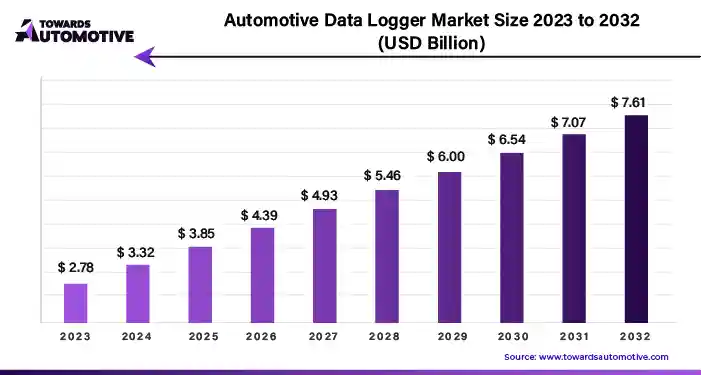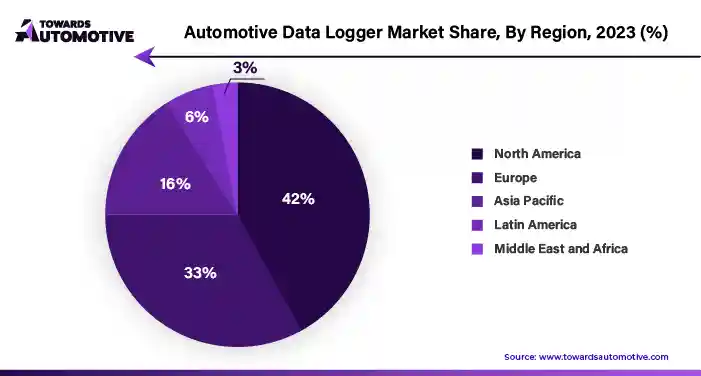Overview
The automotive data logger market, valued at USD 2.78 billion in 2023, is experiencing steady growth and is projected to exceed USD 7.61 billion by 2032, with a notable CAGR of over 11.84%.

Unlock Infinite Advantages: Subscribe to Annual Membership
The automotive data logger market is witnessing rapid growth, driven by the increasing complexity of vehicle systems, stringent regulatory requirements, and the demand for real-time performance monitoring and diagnostics. With vehicles generating vast amounts of data, automotive data loggers play a crucial role in capturing, analyzing, and transmitting critical information for vehicle development, testing, and maintenance purposes. This article delves into key trends, market dynamics, and opportunities shaping the automotive data logger market landscape.
The automotive data logger market is experiencing rapid expansion and innovation, driven by the increasing complexity of vehicle systems, connectivity, and autonomous driving technologies. With vehicles generating vast amounts of data, automotive data loggers play a crucial role in capturing, analyzing, and transmitting critical information for vehicle development, testing, and maintenance purposes. By leveraging advanced sensors, wireless connectivity, and data analysis software, automotive data loggers enable engineers, fleet operators, and service providers to gain actionable insights into vehicle performance, safety, and efficiency, driving innovation and shaping the future of mobility.
The automotive data logger market is experiencing significant expansion, driven by advancements in vehicle technology, connectivity, and autonomous driving systems. Automotive data loggers serve as essential tools for automotive manufacturers, suppliers, and service providers to gather actionable insights into vehicle performance, safety, and efficiency. With the proliferation of electronic components and sensors in modern vehicles, the demand for sophisticated data logging solutions continues to rise.
Key Components and Features of Automotive Data Loggers
- Data Logging Capabilities: Automotive data loggers capture a wide range of data parameters, including vehicle speed, acceleration, braking, engine performance, GPS location, and environmental conditions. These devices utilize high-resolution sensors, data acquisition systems, and storage media to record real-time data streams for analysis and visualization.
- Wireless Connectivity: Many automotive data loggers feature wireless connectivity options such as Wi-Fi, Bluetooth, and cellular networks, enabling remote data access, firmware updates, and cloud-based storage. Wireless connectivity enhances flexibility, scalability, and accessibility for users, allowing them to monitor vehicle data in real-time from any location.
- Data Analysis Software: Automotive data loggers are often accompanied by sophisticated data analysis software that enables users to process, interpret, and visualize vehicle data effectively. These software solutions offer advanced analytics, predictive modeling, and diagnostic tools to identify trends, anomalies, and performance issues in vehicle systems.
- Compliance and Certification: Automotive data loggers comply with industry standards and regulations such as ISO 26262 for functional safety, SAE J1939 for vehicle communication protocols, and ECE R10 for electromagnetic compatibility. Manufacturers ensure that data loggers undergo rigorous testing and certification processes to meet quality, reliability, and safety requirements.
Market Dynamics and Trends
- Rise of Connected and Autonomous Vehicles: The proliferation of connected and autonomous vehicles (CAVs) is driving demand for automotive data loggers capable of capturing and analyzing data from complex vehicle systems. Data loggers play a critical role in testing and validating CAV technologies, ensuring safety, reliability, and regulatory compliance in autonomous driving applications.
- Growing Emphasis on Vehicle Health Monitoring: Automotive data loggers enable proactive vehicle health monitoring by capturing diagnostic trouble codes (DTCs), sensor readings, and performance metrics in real-time. Fleet operators, service centers, and OEMs leverage data loggers to identify maintenance issues, predict component failures, and optimize vehicle uptime and reliability.
- Shift Towards Over-the-Air (OTA) Updates: Automotive data loggers support OTA update capabilities, allowing manufacturers to remotely deploy software updates, firmware patches, and configuration changes to vehicles in the field. OTA updates enhance cybersecurity, software agility, and feature enhancements, ensuring that vehicles remain up-to-date with the latest improvements and enhancements.
- Integration with Telematics and Fleet Management Systems: Automotive data loggers integrate seamlessly with telematics and fleet management systems to provide comprehensive vehicle monitoring, tracking, and reporting capabilities. Fleet operators leverage data loggers to optimize route planning, fuel efficiency, and driver behavior, leading to cost savings and operational efficiencies.
Global Trends and Market Outlook

- North America and Europe Lead Adoption: North America and Europe represent significant markets for automotive data loggers, driven by the presence of leading automotive manufacturers, technology suppliers, and regulatory frameworks. Countries such as the United States, Germany, and the United Kingdom are at the forefront of automotive innovation and technology adoption, driving demand for advanced data logging solutions.
- Asia-Pacific Witnessing Rapid Growth: Asia-Pacific is experiencing rapid growth in the automotive data logger market, driven by the expansion of the automotive industry, investments in research and development, and government initiatives to promote electric vehicles and smart mobility solutions. Countries such as China, Japan, and South Korea are investing in connected car technologies, autonomous driving systems, and infrastructure development, creating opportunities for data logger manufacturers and suppliers.
Challenges and Opportunities
- Data Security and Privacy Concerns: Data security and privacy concerns pose challenges to the automotive data logger market, as vehicles become increasingly connected and data-intensive. Manufacturers and service providers must implement robust cybersecurity measures, encryption protocols, and data anonymization techniques to protect sensitive information and mitigate the risk of unauthorized access or data breaches.
- Interoperability and Standardization: The lack of interoperability and standardization in automotive data logging systems hampers integration, compatibility, and scalability across different vehicle platforms and ecosystems. Industry stakeholders must collaborate to develop common data formats, communication protocols, and interoperability standards that facilitate seamless data exchange and interoperability between diverse systems and devices.
Key Players in the Automotive Data Logger Market
The automotive data logger market comprises a diverse ecosystem of manufacturers, suppliers, and solution providers offering a wide range of data logging solutions and services.
Some of the prominent players in the market include
- National Instruments Corporation
- DEWETRON GmbH
- Vector Informatik GmbH
- TTTech Computertechnik AG
- Racelogic Ltd.
- TQ-Systems GmbH
- Spectris plc
- AEMC Instruments
- Continental AG
- Bosch Connected Devices and Solutions GmbH
Market Segmentation and Regional Outlook
By Component
By Type
- Standalone Data Loggers
- Integrated Data Logging Systems
- Wireless Data Loggers
By Application
- Vehicle Development and Testing
- Fleet Management and Monitoring
- Vehicle Health and Diagnostics
- Autonomous Driving and Connected Vehicles
By Region
- North America
- Europe
- Germany
- United Kingdom
- France
- Asia-Pacific
- Latin America
- Middle East and Africa
Recent Developments in the Automotive Data Logger Market
- In December 2023, National Instruments Corporation introduced a new automotive data logging solution designed for testing and validation of autonomous driving systems. The solution combines high-performance data acquisition hardware with advanced software tools for real-time data processing, enabling engineers to capture and analyze vast amounts of sensor data from autonomous vehicles.
- In November 2023, DEWETRON GmbH launched a compact wireless data logger for vehicle testing and diagnostics applications. The data logger features built-in sensors, GPS tracking, and wireless connectivity options, allowing users to monitor vehicle performance, analyze driving behavior, and conduct in-depth diagnostics remotely.
- In October 2023, Vector Informatik GmbH announced the integration of its automotive data logging software with cloud-based analytics platforms for fleet management and predictive maintenance applications. The integration enables fleet operators to leverage machine learning algorithms and predictive analytics to optimize vehicle uptime, reduce maintenance costs, and enhance overall fleet performance.
- In September 2023, TTTech Computertechnik AG unveiled a new automotive data logging platform with edge computing capabilities for autonomous driving applications. The platform combines real-time data processing with AI-based algorithms to enable advanced sensor fusion, object detection, and decision-making in autonomous vehicles, improving safety and reliability in complex driving scenarios.
- In August 2023, Racelogic Ltd. introduced a next-generation data logging system for vehicle development and testing, featuring high-speed data acquisition, synchronized video recording, and customizable data visualization tools. The data logging system enables engineers to capture precise measurements, analyze vehicle dynamics, and validate performance in various operating conditions, accelerating time-to-market for automotive innovations.

